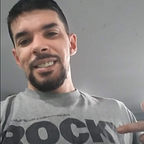The Washington Post Has Got To Be Kidding Me
The Media is Strategically Sensationalizing School Shootings
6 min readMar 20, 2018
I read something yesterday that disturbed me, to the point I knew I had to take the day off from publishing. I was afraid of what I might say if I wrote this in that moment. While I have no problem criticizing The Washington Post I didn’t and still don’t want to pick apart the article in question, nor its author. I don’t have a problem with the article. My issue is with the fact The Washington Post actually published it.
